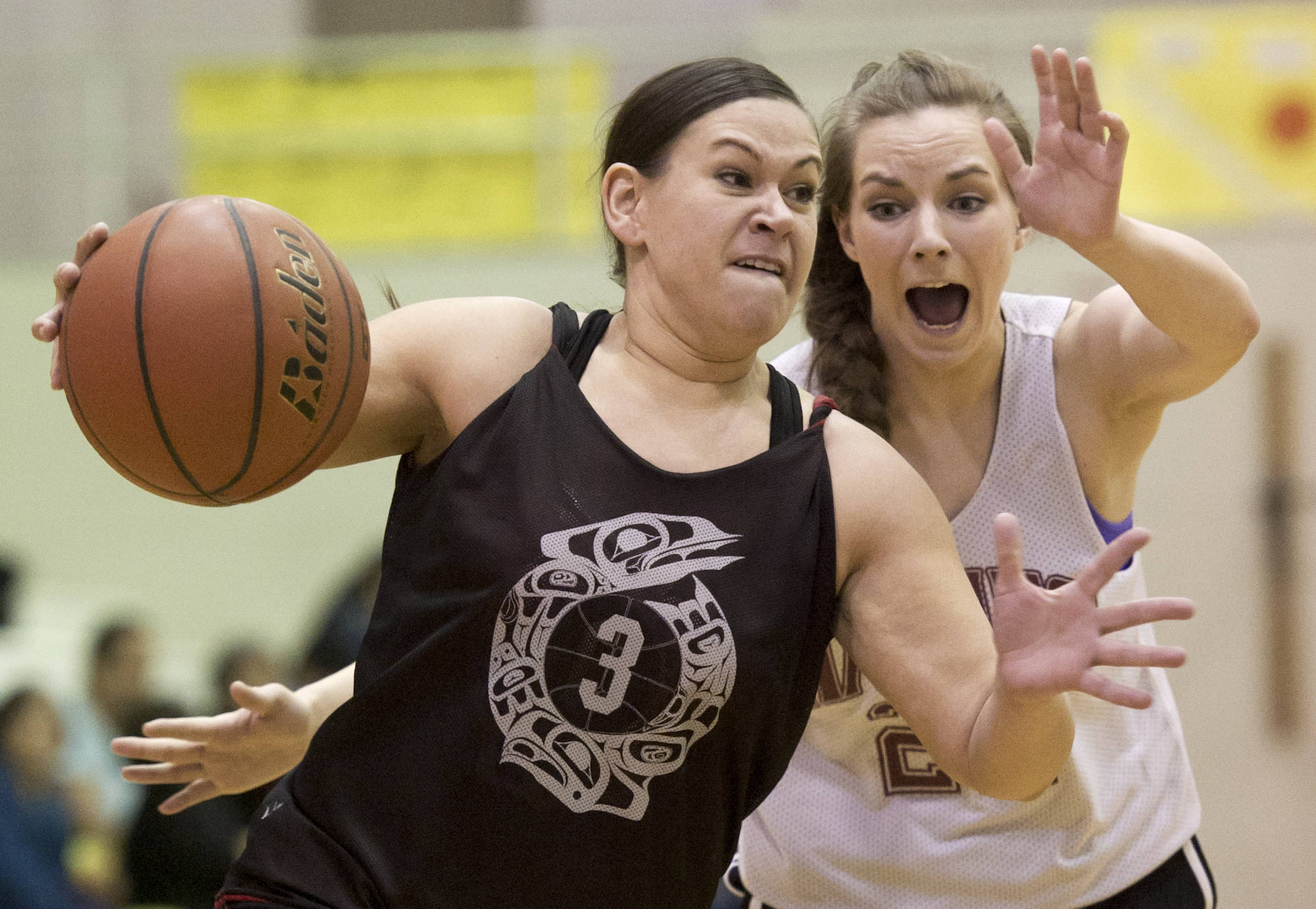After the revival of the women’s Gold Medal bracket in 2014, it didn’t take long for the women to prove they belonged.
As longtime Yakutat player Starr Jensen remembers, the Yakutat team entered that 2014 tournament — the first women’s bracket since 2007 — as the favorite. Yakutat ran through the first couple rounds, but was shocked in the finals when a pesky Angoon team grabbed hold of the game early on and led into the final minutes.
Angoon led by six points with 30 seconds to play, but Yakutat’s Rose Fraker wasn’t ready to give in. She knocked down a deep three with 25.4 seconds remaining, and after two missed Angoon free throws, hit another three with 6.2 to play to tie the game and send it to overtime.
Yakutat went on to win in overtime, 54-51, with Fraker and Justyne Wheeler closing the game out with free throws in the final moments. Jensen admits that she was on the bench for the dramatic finish, but remembers it vividly and said it proved how exciting the women’s tournament can be.
Current Hoonah coach and longtime Gold Medal player and coach Jim Dybdahl also remembered the game, and immediately knew how important it was.
“The thing I remember now is that the women’s teams generated every bit as much excitement for their towns as the men’s teams do,” Dybdahl said. “When you had a very good Angoon women’s team battling a very good Yakutat team, it was every bit as thrilling to watch. That’s kind of when I knew that the women were finally getting that toehold they needed to survive.”
Even Angoon player Carmaleeda Estrada agreed, speaking fondly of the game because it proved just how much entertainment the women’s tournament could offer. Estrada has a great deal of pride in the women’s bracket, especially after playing a major role in bringing it back to the tournament.
Estrada had only been able to play in one Gold Medal prior to its cancellation in 2007, and when she came back to Juneau after college, she had to sit and watch the men’s tournaments. She missed being able to play and wasn’t alone.
“It’s hard to sit in the stands and watch others play and not have that opportunity,” Estrada said. “Not only just for myself, but for other female players, it’s important to have that balance.”
She realized that the only way to get the women back in the tournament would be to get a representative in the Juneau Lions Club to push for the change. Estrada joined in 2013, and immediately began campaigning for the women’s bracket to be added back.
The main arguments against adding the women’s bracket back were low attendance at women’s games, the length of championship day and the fear of a lack of volunteers for the other games, among others. Jensen, who had been on Yakutat’s runner-up team in 2001, wasn’t buying those reasons.
“The women were really upset about it,” Jensen said. “It is unfair. The women have been the biggest supporters of Gold Medal for a long time. They’re always the ones out there fundraising for their teams, for their husbands and sons and everybody to get to Gold Medal, so for us to get excluded, it just kind of felt like a slap in the face.”
Petitions were circling to bring back the women’s bracket, and Facebook groups popped up. Estrada, who works for the Sealaska Heritage Institute in Juneau, took action. She drafted a proposal, which was reviewed and then approved unanimously.
Estrada’s push followed in the footsteps of Kake’s Michelle Martin, whose letters to the Lions Club in 1998 spurred the group to include women in the field. That run lasted from 1999 to 2007, and those involved with the tournament hope this era of the women’s bracket doesn’t have to come to an end.
The future of the tournament is bright, Estrada argues.
“For years, before the women’s bracket, you’ve always seen women supporting men coming to the tournament,” Estrada said. “They help the fundraising, they’re in the crowd, in the stands cheering for their husbands and brothers and fathers. Now it’s interesting to see men, fathers, brothers and dads cheering for their wives, girlfriends and daughters. Especially for our youth, I think it’s so important for them to see that balance and mutual support.”
One of those younger spectators is Jensen’s daughter Shaye. The 16-year-old has been to every Gold Medal tournament since she was born, watching both her mother and her father (another longtime player) her whole life.
She’ll again be there this year to watch her mother’s Yakutat team play. Starr, now in her late thirties, can’t wait for her daughter to be eligible to play in games that bring the community together such as that 2014 classic.
“It’s just part of our culture and I definitely think it’s something she’s looking forward to doing,” Jensen said. “I am hoping that I can still play for two more years so that she and I can play together.”
• Contact reporter Alex McCarthy at 523-2271 or alex.mccarthy@juneauempire.com

